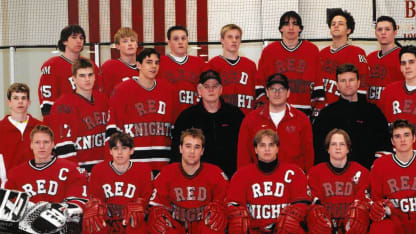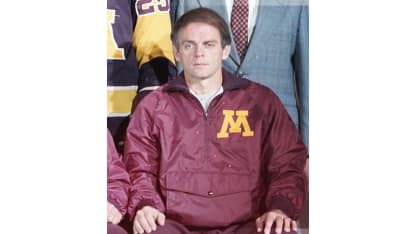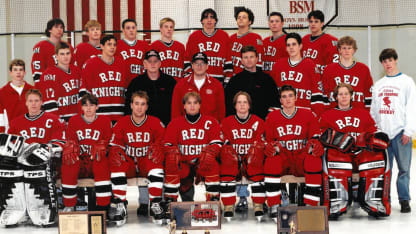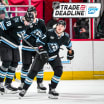Blatherwick had Miracle on Ice role, wins Lester Patrick Trophy
Innovative physiologist recognized for outstanding service to hockey in United States

Brooks, who would coach the United States to the gold medal, had a special interest in Blatherwick's research, particularly since he'd opt to incorporate many of his findings into his daily on- and off-ice practice routines.
"He'd usually ring me between 5:30 and 6 o'clock in the morning," Blatherwick said about the Hall of Fame coach. "He woke me up, but he cared. He wanted to learn about my goals and wanted me to stay on schedule. Herb really believed in science and he let me test while he coached at the University of Minnesota.
"When I was in college there was no information about the best way to develop young athletes. I soon discovered that off-ice sprint speed and vertical jump explosiveness were related to skating speed, so those areas were really important for young players hoping to gain the athleticism of a hockey player."
The 77-year-old, who holds a doctorate in sports physiology and is widely recognized as one of hockey's top innovative thinkers, will be honored with the Lester Patrick Trophy during the United States Hockey Hall of Fame Induction ceremony in Washington, D.C. on Dec. 12. The award is presented annually for outstanding service to hockey in the United States.
"My dad had a special relationship with Jack," said Daniel Brooks, Herb's son. "Jack was his main advisor on helping him implement more of a fast-paced, highly-skilled European type game. Herb was obsessed with the Soviet style of game and training and Jack, being a professor, sure helped him with that transition."
Daniel Brooks, whose dad became a household name after the gold-medal win, said Blatherwick's approach was a key component to the Miracle on Ice victory against the Soviet Union in the first game of the medal round.

© Courtesy: USA Hockey
"They had a unique relationship; they were very different yet very close," Daniel Brooks said. "My dad would tease Jack about being too smart. To be honest, I don't think the Miracle on Ice could have happened without Jack."
Blatherwick entered the doctorate program at the University of Minnesota School of Physiology in 1975, proving in his dissertation that speed can be taught and learned through off-ice training. He tested 3,000 players from Pee Wee-to-NHL level and verified the off-ice attributes related to skating speed and acceleration.
He earned the nickname Cardiac Jack by players from the Minnesota North Stars because of his workouts and continuous use of the words 'cardiovascular fitness' in his part-time role as conditioning coach in 1979-80.
"My biggest finding was that by training for intervals of speed and quickness off ice, you can improve on-ice speed and quickness," Blatherwick said. "It wasn't just about training players from the 1980 team to skate faster but train them to perform skills and decisions at that speed.
"That's what I call overspeed training; training so fast that they have to make decisions and perform skills at a speed that's usually uncomfortable for those skills. That was the thrust of the training for the 1980 Olympic Team."
Brooks was a catalyst for the movement, and he utilized Blatherwick and the physiological testing to validate his belief. After all, the Soviet Union was having great success in building its players off and on ice.
"The Soviets at that time wouldn't even think of developing a hockey player just on-ice, and neither would a speed skating coach," Blatherwick said.
Blatherwick, who served as Brooks' strength and conditioning coach at the University of Minnesota, said working with Brooks was a special time in his life.
"His life basically was driven by the need to help or motivate to reach a common goal, and he'd do it relentlessly," Blatherwick said.
In addition to playing his part in the Miracle on Ice, Blatherwick had similar advisory roles with the New York Rangers, New Jersey Devils, and Washington Capitals, as well as five more U.S. Olympic teams, including the U.S. Women's gold medal-winning team at the 2018 PyeongChang Olympics.

© Courtesy: USA Hockey
He spent over five decades in the Minnesota high school hockey ranks, including 11 seasons as coach and math teacher at Breck School. He later worked for Wayzata, Hamline University, Hopkins and Minnehaha Academy. He graduated from Minnehaha in 1960, where he played football, hockey and golf.
Blatherwick joined the staff of Benilde-St. Margaret's in 1997 as an assistant for eight seasons where he worked as the director for athletic development. The high school won two Class A state championships during his tenure and Blatherwick was inducted into the Minnesota High School Hockey Coaches Association Hall of Fame in 2009.
Blatherwick was defense coach at Benilde-St. Margaret's at the time he began working with defenseman Andrew Alberts. Alberts transferred to Benilde-St. Margaret's from Eden Prairie and was under Blatherwick's guidance for two seasons.
"Andrew wouldn't mind reading that I said he was maybe the worst skater I'd ever seen try out for a high school team," Blatherwick said. "I started working with him right away because he was such a gung-ho athlete.
"About halfway through the fall season, he asked me, 'Do you think I have a chance of making the junior varsity?' and I said, 'Andrew, I've never said this before and probably will never say it again, but I think you can play in the National Hockey League ... you just have to learn how to skate.' "
Alberts not only became a two-time NCAA Division I All-American at Boston College, but was an NHL defenseman for nine seasons with the Boston Bruins, Philadelphia Flyers, Carolina Hurricanes and Vancouver Canucks.
"Off-ice training was all plyometrics that involved uphill and downhill sprints," Alberts said. "Everything was about trying to mimic a skating stride or move that would transfer on ice. It was practicing good muscle memory, staying in that skating position walking up a hill or crossing over up a hill to build the fiber muscles in your legs.
"On ice we went as fast we could, trying to gain control and getting as low as possible in the skating position because once you're there you create that muscle memory so that when you do have the puck, you can keep playing at that same speed. If you can constantly play at a high level, you're going to push the pace."
Blatherwick still organizes on- and off-ice training sessions for motivated athletes in Minnesota.
"He's the only person I've ever seen who can run a skating clinic or skating program on the ice with players aged 5-to-40 years old and benefitting from it and all looking forward to coming to each session that he ran," said U.S. Hockey Hall of Fame member Lou Vairo. "Jack Blatherwick personifies the essence of what the Lester Patrick award is all about."

















